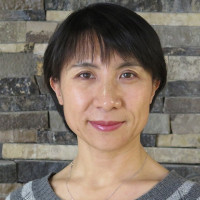Lixia Yang

Director, Cognitive Aging Laboratory (CAL)
Professor
Faculty of Arts
Department of Psychology
Toronto, Ontario
lixiay@torontomu.ca
Office:
(416) 979-5000 ext. 556522
Expert In
Aging and cognition
Cognitive plasticity
COVID-19 Chinese community support
COVID-19 impact on Chinese living in North America
Cultural differences in attention and memory
Culture
Culture and memory
Emotional-cognition interaction in aging
Memory
Moderation of emotion and stress
Plasticity of the aging brain
Ryerson Advisory Committee to Combat Anti-Asian Racism
Theme: Health and wellbeing
Bio/Research
Dr. Yang received her Ph.D. in Psychology from the Chinese Academy of Sciences in 2000. She then did her postdoctoral fellowship training at the Max‐Planck Institute for Human Development in Berlin and the University of Toronto. In 2005, Dr. Yang joined the Department of Psychology at Toronto Met...
Click to Expand >>
Click to Expand >>
Bio/Research
Dr. Yang received her Ph.D. in Psychology from the Chinese Academy of Sciences in 2000. She then did her postdoctoral fellowship training at the Max‐Planck Institute for Human Development in Berlin and the University of Toronto. In 2005, Dr. Yang joined the Department of Psychology at Toronto Metropolitan University.
Dr. Yang’s research addresses aging- and culture-related topics, such as cognitive plasticity of the aging brain; cultural differences in social engagement and cognition; as well as aging-related differences in memory, executive functions, and more specifically processing emotional information. Her research has been funded through NSERC and Canadian Institutes of Health Research (CIHR). Her recent research also addresses psychological wellbeing of minoritized immigrant populations in Canada, during the pandemic specifically. To date, Dr. Yang has 82 peer-reviewed publications (including 6 book chapters) and numerous invited talks and presentations. Her research has been published in high-impact journals such as Brain and Cognition, Cognition and Emotion, Psychology and Aging, and Psychological Science. As a recognition of her research and supervision contributions, Dr. Yang received the 2021 Dean’s Scholarly, Research and Creative Activity Award and the Ryerson 2015 YSGS (Yeates School of Graduate Studies) Outstanding Contribution to Graduate Education Award. In professional service, Dr. Yang served as the associate editor for the Wiley Blackwell Encyclopedia of Adulthood and Aging and as a reviewer for a list of journals and grant agents. As a testimony for her community contribution, Dr. Yang also received a few community service awards, including the 2022 Queen’s Platinum Jubilee Award for Outstanding Community Contribution.
Dr. Yang has taught a variety of undergraduate (e.g., Child Development, Adult Development, Introduction to Psychology, and Advanced Seminars in Development or Cognition) and graduate courses (i.e., Advanced Seminar in Cognition, Cognitive Aging, and Psychology of Aging). She has been nominated by students as “A Prof Who Made A Mark” in 2014. Meanwhile, Dr. Yang has been actively involved in supervising undergraduate honours thesis, practicum students, undergraduate research assistants, and independent research projects in Psychology.
Click to Shrink <<
Dr. Yang’s research addresses aging- and culture-related topics, such as cognitive plasticity of the aging brain; cultural differences in social engagement and cognition; as well as aging-related differences in memory, executive functions, and more specifically processing emotional information. Her research has been funded through NSERC and Canadian Institutes of Health Research (CIHR). Her recent research also addresses psychological wellbeing of minoritized immigrant populations in Canada, during the pandemic specifically. To date, Dr. Yang has 82 peer-reviewed publications (including 6 book chapters) and numerous invited talks and presentations. Her research has been published in high-impact journals such as Brain and Cognition, Cognition and Emotion, Psychology and Aging, and Psychological Science. As a recognition of her research and supervision contributions, Dr. Yang received the 2021 Dean’s Scholarly, Research and Creative Activity Award and the Ryerson 2015 YSGS (Yeates School of Graduate Studies) Outstanding Contribution to Graduate Education Award. In professional service, Dr. Yang served as the associate editor for the Wiley Blackwell Encyclopedia of Adulthood and Aging and as a reviewer for a list of journals and grant agents. As a testimony for her community contribution, Dr. Yang also received a few community service awards, including the 2022 Queen’s Platinum Jubilee Award for Outstanding Community Contribution.
Dr. Yang has taught a variety of undergraduate (e.g., Child Development, Adult Development, Introduction to Psychology, and Advanced Seminars in Development or Cognition) and graduate courses (i.e., Advanced Seminar in Cognition, Cognitive Aging, and Psychology of Aging). She has been nominated by students as “A Prof Who Made A Mark” in 2014. Meanwhile, Dr. Yang has been actively involved in supervising undergraduate honours thesis, practicum students, undergraduate research assistants, and independent research projects in Psychology.
Click to Shrink <<